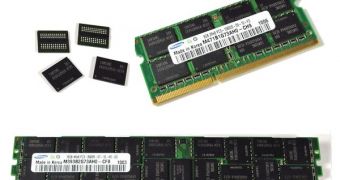Even though the so-called economic recession is slowly going away, a variety of other factors, such as diminishing resources and technological advancements, seems to have finally brought about a situation where a certain hardware maker is forced, or at least inclined, to raise components prices. To be more specific, Samsung Electronics wants to increase DDR3 memory contract quotes in May, a move which seems to have been most effective at stirring the discontent of PC vendors.
According to DRAMeXchange, late April contract prices for 1Gb DDR2 rose by 2-3%, to average US$2.50. This led to 2GB DDR2 modules being sold for US$43. DDR3 prices, however, remained unchanged (2GB modules sold for US$46 on average). Still, times seem to have caught up, and Samsung now seeks to inflate DDR3 as well.
According to sources cited by Digitimes, Samsung, at first, offered PC customers, especially major clients, lower contract prices than its rivals, such as Hynix Semiconductor and Nanya Technology. Now, while competitors are faced with supply shortages, due to process transition, the company seeks to score higher prices.
Because of this, negotiations with PC vendors aren't going as well as they could, and some contracts have even been put on hold. Basically, PC vendors don't approve of such a move during the slower first and second quarters.
“PC vendors are disagreeing with Samsung on its new prices for DDR3 chips, which has left May contract prices unsettled, the sources indicated, commenting that it is difficult for the chip vendor to raise prices during the weak season,” the report states.
In the mean time, Hynix either kept the same prices or slightly raised them in May, whereas Nanya kept them flat. DRAMeXchange reported tags, in the low range, of US$45/46, up from US$44/45. PC vendors insisted on flat prices, however, which is why most deals ended with a mild price hike at most.

 14 DAY TRIAL //
14 DAY TRIAL //